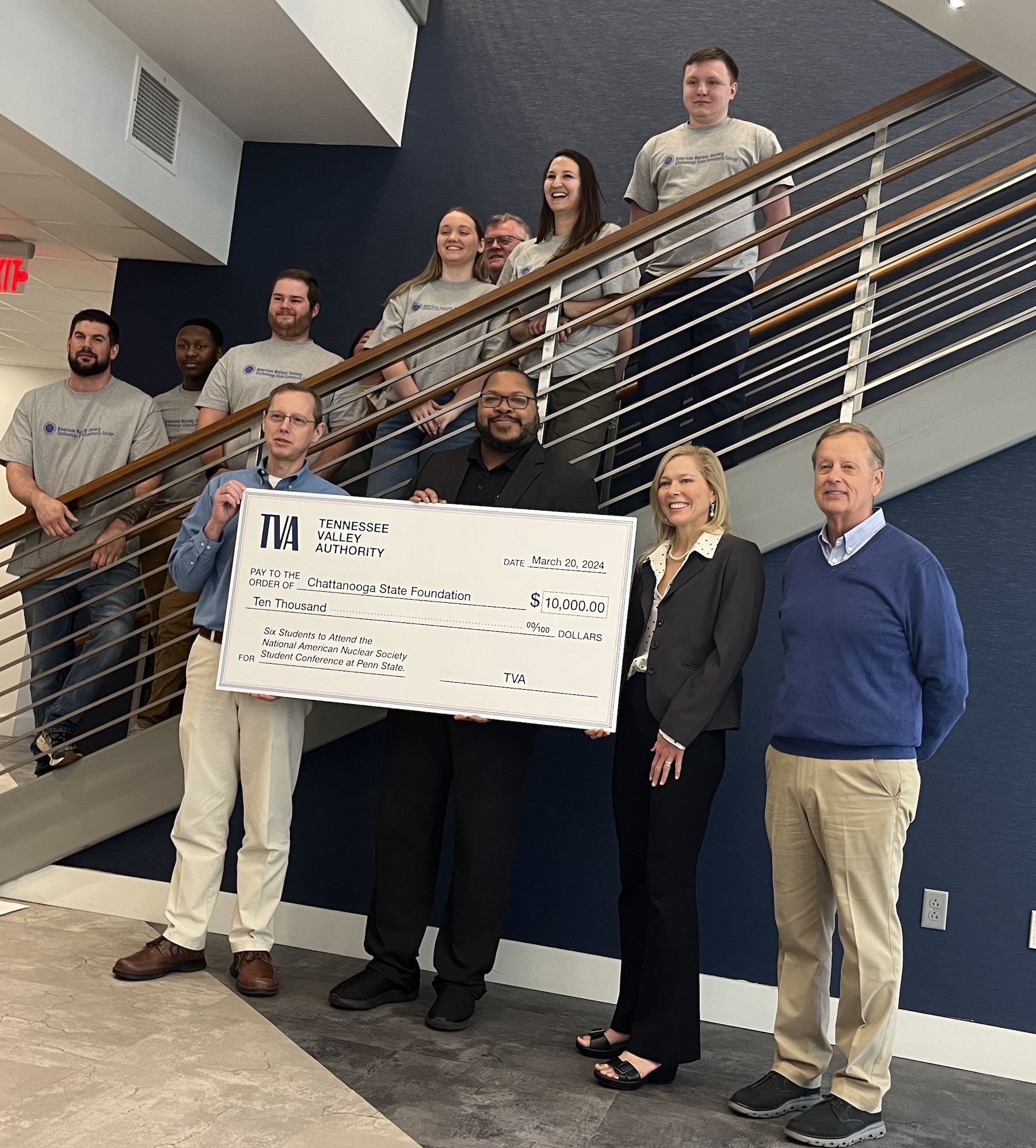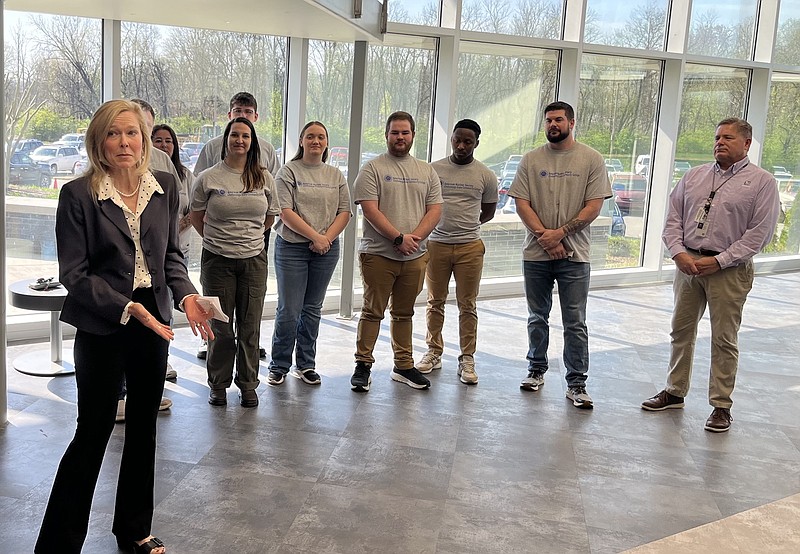Laurel Crawley worked as a bartender for 12 years in Chattanooga. It was a job where she heard some of her customers talking about opportunities in the nuclear field.
Eager to improve her financial standing, Crawley took advantage of the Tennessee Reconnect program to enroll in a nuclear medicine program at Chattanooga State Community College and soon learned about an even more promising career potential in radiation protection.
"I started last fall in the radiation protection program, and so far classes have been great and I'm really excited about the future," Crawley said Wednesday during an interview at Chattanooga State. "This is a great paying field, a lot better than bar tending."
(READ MORE: Nuclear power fuels Tennessee economy, study says)
Students completing the two-year radiation protection and nuclear engineering technology degree programs at Chattanooga State are typically starting jobs at nuclear or chemical plants with annual incomes nearly double the median pay for workers in Chattanooga of $49,729, according to the U.S. Bureau of Labor Statistics. After training on the job, such workers can usually expect to earn more than $100,000 a year, according to those involved in the program.
To help such students learn about their options and America's nuclear future, Crawley and a handful of others in the student chapter of the American Nuclear Society at Chattanooga State will be heading to a three-day conference next month at Penn State University. The Tennessee Valley Authority, which has helped develop the nuclear programs at Chattanooga State and hires many of its graduates, donated $10,000 to the college program Wednesday.
Chattanooga State boasts the only student chapter of the American Nuclear Society in America from a community college, and TVA will pay for six of the members to attend the April 6-9 conference at Penn State.
"I think this support from TVA says a lot about the importance of our partnerships with employers and providing them with a skilled workforce," Chattanooga State President Rebecca Ashford said during an interview Wednesday. "It makes me really proud that we are the only community college in the state that has this program to help fill these important jobs."
Vanderbilt and the University of Tennessee in Knoxville also have nuclear engineering degrees.
(READ MORE: Watts Bar may boost production of key nuclear weapons material)
Jay Wells, a 24-year-old student in his first year studying nuclear engineering technology, is president of the student chapter of the American Nuclear Society at Chattanooga State.
Wells said he began working for contractors at TVA's Sequoyah and Watts Bar nuclear power plants when he got out of high school and learned from workers there about the program at Chattanooga State.
"I got here and have been in love with it ever since," Wells said in an interview on campus Wednesday. "I think I've found my passion and it's great that this is right here in Chattanooga where I want to stay."
Wells and most of the other students in the program are getting their tuition paid by either the Tennessee Promise program for those coming out of high school or Tennessee Reconnect for those returning to higher education. The state programs pay for two years of higher education at state community colleges like Chattanooga State.
Wells said he hopes to eventually become a senior reactor operator and even an instructor for other reactor operators at a TVA nuclear plant.
Wells said the conference at Penn State "should help us connect with more people in the industry and learn more about our future career options."
Wells is among 15 students now enrolled in the two-year nuclear operations or radiation protection degree programs at Chattanooga State, which has been offering different degree programs to serve the nuclear power industry for more than a decade. Chattanooga State began its radiation protection program 14 years ago and added the nuclear engineering technology program in 2011 with the support of the Tennessee Valley Authority.
The program had nearly twice as many students in the past. But Terry Newman, a former TVA nuclear manager who teaches at Chattanooga State, said enrollment shrunk during the pandemic.
"It's a rigorous program, but we have an open enrollment at Chattanooga State, and if you apply yourself, there are a lot of great career opportunities you can be in after completing our two-year program," he said.
Newman said the average graduate from the nuclear engineering technology program or the radiation protection program is now earning about $80,000 to start and after training usually advances into jobs that pay as much as $120,000 a year, with overtime.
"When you enter these fields, it's more than a job — it's a career," Newman said during Wednesday's event at Chattanooga State.
Tom Fowler, corporate operations training manager for TVA, said he hopes more students will enroll in the program to help staff the nuclear operations at TVA and Oak Ridge, along with other chemical and nuclear-related businesses and other utilities, chemical manufacturers. TVA is the first U.S. utility to obtain an early site permit for the next generation of nuclear power and plans to build a small modular reactor in Oak Ridge.
Contact Dave Flessner at dflessner@timesfreepress.com or 423-757-6340.
 Staff Photo by Dave Flessner / Holding a $10,000 check from the Tennessee Valley Authority to fund the trip by students on the stairwell headed to Penn State University next month are, from left, Tom Fowler, corporate operations training manager for TVA; Trey Powell, dean of engineering at Chattanooga State; college President Rebecca Ashford; and Terry Newman, an associate professor at Chattanooga State.
Staff Photo by Dave Flessner / Holding a $10,000 check from the Tennessee Valley Authority to fund the trip by students on the stairwell headed to Penn State University next month are, from left, Tom Fowler, corporate operations training manager for TVA; Trey Powell, dean of engineering at Chattanooga State; college President Rebecca Ashford; and Terry Newman, an associate professor at Chattanooga State.